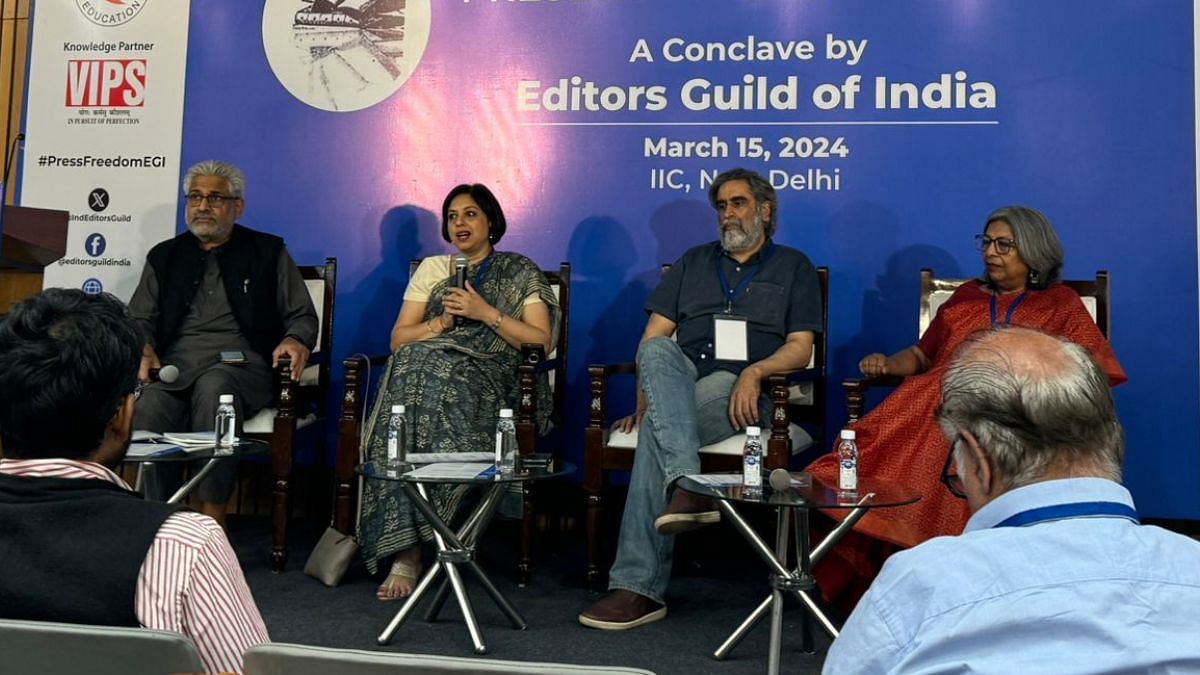New Delhi: Social media is increasingly serving as a bridge between readers and the media. However, it has also become a battleground of sorts with journalists frequently facing questions not just about their work but also their identity as Indians.
This is a question Suhasini Haidar, Deputy Editor at The Hindu, is repeatedly asked on X. “I answer by saying that I am an Indian and being a journalist is what I do. Your identity as an Indian is expected to completely subsume all other identities, including what you do,” she said.
Haider was speaking during a panel discussion at the Editors Guild Conclave, a day-long event held at Delhi’s India International Centre Friday. The Editors Guild of India is an organisation dedicated to protect freedom of press.
Key issues discussed at the conclave included the spread of misinformation, democracy, challenges in the digital era, nationalism, and propaganda.
Speaking about how the line between nationalism and patriotism has been blurred, Haider defined what the two terms mean. “Patriotism means you love your country for what it does and nationalism means you are proud of your country no matter what it does. In other words, you are not expected to question,” she said.
The panel discussion, titled ‘Nationalism, Propaganda and Media’, included Hartosh Singh Bal, Executive Editor of The Caravan, and senior political journalist and columnist Smita Gupta.
Reminiscing about the “good old days” of journalism, Gupta said, “We could go into a minister’s room without an appointment and people would talk to us. I was just starting out, in my 20s, and it felt like it was the norm. There was a structure. There was a principal information officer, expected to hold one precise briefing every day and people were allowed to ask questions.”
But, she added, something changed once Prime Minister Narendra Modi came to power.
“Earlier, we never felt like we couldn’t get access to information. All prime ministers before Narendra Modi used to have an annual press conference, where the PM would open himself up to all kinds of questions.”
Also read: Hindu nationalism has taken first steps toward establishing a Jim Crow system
‘Govt wants to shut down everyone else’
On 13 March, the Bombay High Court refused to accept applications seeking a stay on the Union government’s Fact-Check Unit (FCU). The applications were filed by stand-up comedian Kunal Kamra, the Editors Guild of India, the Association of Indian Magazines, and News Broadcasters and Digital Association.
During a discussion on misinformation and fake news in the digital space, Ritu Kapur, CEO of news website Quint, asked, “If PIB already has a fact check unit, why is another body needed? What is the intention here and how is it going to impact digital news?”
She was part of the session titled, ‘Challenges in Digital Era’, which included Dhanya Rajendran, Editor-in-Chief of The News Minute, and Nikhil Pahwa, founder of Medianama, and was moderated by senior journalist Jyoti Malhotra.
Rajendran — also the chairman of DigiPub, a non-profit organisation formed by digital media outfits — shared a story of a Tamil YouTube channel that was taken down for allegedly being a “threat to national security of India”. The YouTuber started another channel under a different name, which was also taken down within a few days.
“Finally, they were called to the information broadcasting ministry in Delhi. They were brought from Chennai to Delhi for an online meeting. The ministry guy was sitting in another room and they were in a different room and they had an online meeting,” she said. “They were asked questions like, ‘are you anti national? Are you against India’s security?’. This small YouTube channel fought. They went to court and their channel is back online.”
Talking about misinformation and fake news, she said, “I don’t want to mince words. The purveyor of misinformation/disinformation and fake news is the ruling party and the government. They want to shut down everyone else.”
Rajendran also spoke about bills introduced by the government for regulating content.
“They (government) came with the digital media act under which they brought several rules for the digital media houses and now we have the broadcast bill and the telecom bill. The government is doing everything that it should not do. It wants to run fact checking units, shut down media houses,” she said. “We are in a constant battle with the government and we should not forget that.”
(Edited by Zinnia Ray Chaudhuri)
Also read: Misinformation ‘greatest risk’ for India, finds WEF report. Environmental risk ‘highest’ overall category

